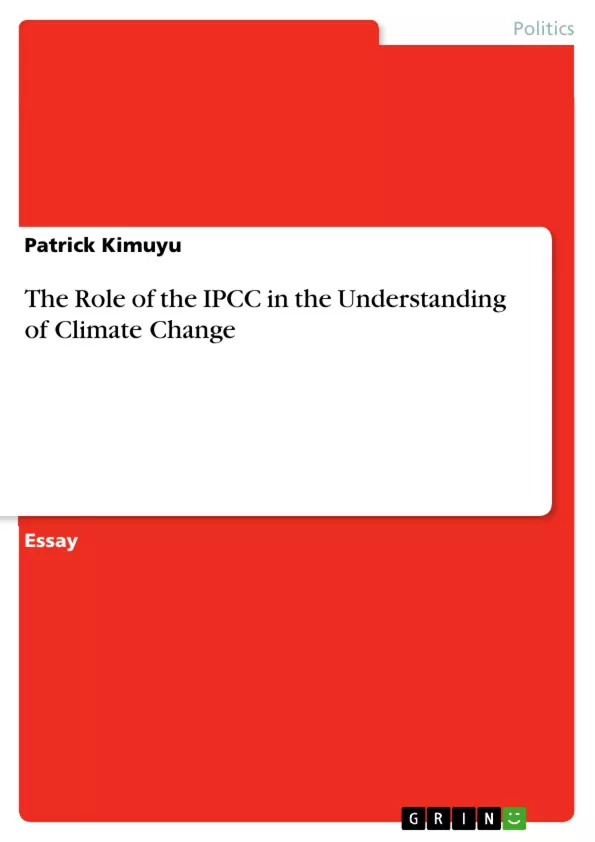Climate change seems to be a unique phenomenon owing to the numerous controversies surrounding it. This is why there exists a great divide between environmentalists and their challengers over the issue of climate change. To the present, the debate on climate change has taken diverse perspectives in which the critical issue is whether climate change is a factual or false phenomenon.
In order to enhance understanding over the issue of climate change, a number of international agencies have been formed. One of the most proactive agencies that have immense contribution to the issue is the Intergovernmental Panel on Climate Change (IPCC). This scientific intergovernmental body was established in 1988 by the United Nations Environment Programme (UNEP) and the World Meteorological Organization (WMO). Following its endorsement by the UN General Assembly the same year, IPCC became one of the organizations under the auspices of the UN. Its core responsibility is to review and assess scientific, socio-economic and technical information related to climate change and prepare assessment reports for the United Nations Framework Convention on Climate Change (UNFCCC). Its reports focus on the risks of human-induced climate change, as well as, its potential socio-economic and environmental impacts. As such, IPCC reports propose the most appropriate mitigation approaches to climate change.
Since its inception, IPCC has contributed immensely to the assessment of climate change. Therefore, this paper provides a comprehensive discussion on IPCC’s contribution to the climate change debate. It will also present a critical assessment of the linkage between the agency’s values and interests, its advocacy positions and its use of science.
Inhaltsverzeichnis (Table of Contents)
- Introduction
- IPCC's Contribution to Climate Change Debate
- Connection between IPCC's Values and Interests
- Personal Appraisal of IPCC
- Conclusion
- References
Zielsetzung und Themenschwerpunkte (Objectives and Key Themes)
This paper provides a comprehensive discussion on the Intergovernmental Panel on Climate Change (IPCC)'s contribution to the climate change debate. It will also present a critical assessment of the linkage between the agency's values and interests, its advocacy positions, and its use of science.
- The role of the IPCC in the climate change debate
- The relationship between the IPCC's values and interests
- The IPCC's approach to scientific evidence and its assessment process
- The impact of IPCC reports on climate change mitigation policies
- The credibility and neutrality of the IPCC
Zusammenfassung der Kapitel (Chapter Summaries)
- Introduction: This chapter introduces the climate change debate and the role of the IPCC in addressing this issue. It highlights the controversies surrounding climate change and the importance of understanding the phenomenon.
- IPCC's Contribution to Climate Change Debate: This chapter examines the contribution of IPCC to the climate change debate through its assessment reports. It discusses the scientific knowledge documented in these reports and their impact on climate change mitigation advocacy.
- Connection between IPCC's Values and Interests: This chapter explores the connection between the values and interests of the IPCC. It emphasizes the agency's neutrality, independence, and reliance on evidence-based scientific approaches.
Schlüsselwörter (Keywords)
The primary terms and concepts addressed in this paper include climate change, Intergovernmental Panel on Climate Change (IPCC), assessment reports, greenhouse gases, mitigation, values, interests, scientific evidence, neutrality, and policy prescriptive.
Frequently Asked Questions
What is the IPCC?
The Intergovernmental Panel on Climate Change (IPCC) is a scientific body established in 1988 by UNEP and WMO to assess information related to climate change.
What is the primary responsibility of the IPCC?
Its core task is to review and assess scientific, socio-economic, and technical information and prepare assessment reports for the UNFCCC.
Are IPCC reports policy-prescriptive?
No, the IPCC aims to be policy-relevant but not policy-prescriptive, providing evidence-based approaches for mitigation without mandating specific laws.
How does the IPCC contribute to the climate change debate?
It provides a comprehensive scientific foundation that documents risks of human-induced climate change and its environmental impacts.
Is the IPCC a neutral organization?
The paper examines the agency's neutrality and independence, emphasizing its reliance on evidence-based scientific approaches despite surrounding controversies.
- Quote paper
- Patrick Kimuyu (Author), 2016, The Role of the IPCC in the Understanding of Climate Change, Munich, GRIN Verlag, https://www.grin.com/document/378955



